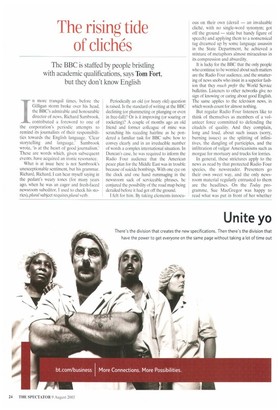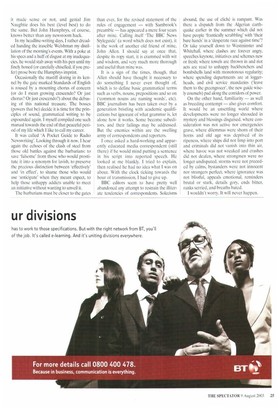The rising tide of clichés
The BBC is staffed by people bristling with academic qualifications, says Tom Fort, but they don't know English In more tranquil times, before the Gilligan storm broke over his head, the BBC's admirable and honourable director of news, Richard Sambrook, contributed a foreword to one of the corporation's periodic attempts to remind its journalists of their responsibilities towards the English language. 'Clear storytelling and language,' Sambrook wrote, 'is at the heart of good journalism.' These are words which, given subsequent events, have acquired an ironic resonance.
What is at issue here is not Sambrook's unexceptionable sentiment, but his grammar. Richard, Richard, I can hear myself saying in the pedant's weary tones (for many years ago, when he was an eager and fresh-faced newsroom subeditor, I used to check his stories), plural subject requires plural verb. Periodically an old (or hoary old) question is raised, Is the standard of writing at the BBC declining (or plummeting or plunging or even in free-fall)? Or is it improving (or soaring or rocketing)? A couple of months ago an old friend and former colleague of mine was scratching his receding hairline as he pondered a familiar task for BBC subs: how to convey clearly and in an irreducible number of words a complex international situation. In Duncan's case, he was required to inform the Radio Four audience that the American peace plan for the Middle East was in trouble because of suicide bombings. With one eye on the clock and one hand rummaging in the newsroom sack of serviceable phrases, he conjured the possibility of the road map being derailed before it had got off the ground.
I felt for him. By taking elements innocu
ous on their own (derail — an invaluable cliche, with no single-word synonym; got off the ground — stale but handy figure of speech) and applying them to a nonsensical tag dreamed up by some language assassin in the State Department, he achieved a mixture of metaphors almost miraculous in its compression and absurdity.
It is lucky for the BBC that the only people who continue to be worried about such matters are the Radio Four audience, and the smattering of news snobs who insist in a superior fashion that they much prefer the World Service bulletins. Listeners to other networks give no sign of knowing or caring about good English. The same applies to the television news, in which words count for almost nothing.
But regular Radio Four listeners like to think of themselves as members of a volunteer force committed to defending the citadels of quality. And they complain, long and loud, about such issues (sorry, burning issues) as the splitting of infinitives, the dangling of participles, and the infiltration of vulgar Americanisms such as morgue for mortuary and trucks for lorries.
In general, these strictures apply to the news as read by that protected Radio Four species, the newsreader. Presenters go their own sweet way, and the only newsroom material regularly entrusted to them are the headlines. On the Today programme, Sue MacGregor was happy to read what was put in front of her whether
it made sense or not, and genial Jim Naughtie does his best (level best) to do the same. But John Humphrys, of course, knows better than any newsroom hack.
In my headline-writing days. I rather dreaded handing the irascible Welshman my distillation of the morning's events. With a poke at his specs and a huff of disgust at my inadequacies, he would stab away with his pen until my finely honed (or carefully chiselled, if you prefer) prose bore the Humphrys imprint.
Occasionally the mastiff dozing in its kennel by the gate marked Standards of English is roused by a mounting chorus of concern (or do I mean growing crescendo? Or just chorus? Or just crescendo?) about the debasing of this national treasure, The bosses (powers that be) decide it is time for the principles of sound, grammatical writing to be expounded again. I myself compiled one such manual towards the end of that peaceful period of my life which I like to call my career.
It was called 'A Pocket Guide to Radio Newswriting'. Looking through it now, I hear again the echoes of the clash of steel from those old battles against the barbarians: to save 'fulsome' from those who would prostitute it into a synonym for lavish, to preserve the precious distinction between 'effectively' and in effect', to shame those who would use 'anticipate' when they meant expect, to help those unhappy addicts unable to meet an initiative without wanting to unveil it.
The barbarians must be closer to the gates than ever, for the revised statement of the rules of engagement — with Sambrook's preamble — has appeared a mere four years after mine. Calling itself The BBC News Styleguide' (a word which does not exist), it is the work of another old friend of mine, John Allen. I should say at once that, despite its ropy start, it is crammed with wit and wisdom, and very much more thorough and useful than mine was.
It is a sign of the times, though, that Allen should have thought it necessary to do something I never even thought of, which is to define basic grammatical terms such as verbs, nouns, prepositions and so on ('common nouns are naming words', etc). BBC journalism has been taken over by a generation bristling with academic qualifications but ignorant of what grammar is, let alone how it works. Some become subeditors, and their failings may be addressed. But the enemies within are the swelling army of correspondents and reporters.
I once asked a hard-working and apparently educated media correspondent (still there) if he would mind putting a sentence in his script into reported speech. He looked at me blankly. I tried to explain, then realised he had no idea what I was on about. With the clock ticking towards the hour of transmission, I had to give up.
BBC editors seem to have pretty well abandoned any attempt to restrain the illiterate tendencies of correspondents. Solecisms abound, the use of cliche is rampant. Was there a dispatch from the Algerian earthquake earlier in the summer which did not have people 'frantically scrabbling' with 'their bare hands' in a 'desperate race against time'? Or take yourself down to Westminster and Whitehall, where clashes are forever angty, speeches keynote, initiatives and schemes new or fresh; where towels are thrown in and riot acts are read to unhappy backbenchers and bombshells land with monotonous regularity; where spending departments are at loggerheads, and civil service mandarins ('leave them to the greengrocer', the new guide wisely counsels) pad along the corridors of power.
On the other hand, familiarity — as well as breeding contempt — also gives comfort. It would be an unsettling world where developments were no longer shrouded in mystery and blessings disguised, where consideration was not active nor emergencies grave, where dilemmas were shorn of their horns and old age was deprived of its ripeness, where ships did not limp into port and criminals did not vanish into thin air, where havoc was not wreaked and crashes did not deafen, where strongmen were no longer undisputed, storms were not preceded by calms, bystanders were not innocent nor strangers perfect, where ignorance was not blissful, appeals emotional, reminders brutal or stark, details gory, ends bitter, ranks serried, and breaths bated.
I wouldn't worry. It will never happen.



































































 Previous page
Previous page